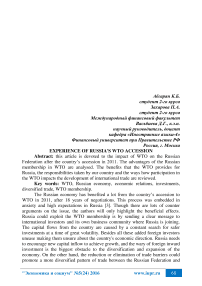Experience of Russia's WTO accession
Автор: Абгарян К.Б., Захарова П.А.
Журнал: Экономика и социум @ekonomika-socium
Статья в выпуске: 5-1 (24), 2016 года.
Бесплатный доступ
This article is devoted to the impact of WTO on the Russian Federation after the country’s accession in 2011. The advantages of the Russian membership in WTO are analysed. The benefits that the WTO provides for Russia, the responsibilities taken by our country and the ways how participation in the WTO impacts the development of international trade are reviewed.
Wto, russian economy, economic relations, investments, diversified trade, wto membership
Короткий адрес: https://sciup.org/140119726
IDR: 140119726
Текст научной статьи Experience of Russia's WTO accession
The Russian economy has benefited a lot from the country’s accession to WTO in 2011, after 18 years of negotiations. This process was embedded in anxiety and high expectations in Russia [3]. Though there are lots of counter arguments on the issue, the authors will only highlight the beneficial effects. Russia could exploit the WTO membership is by sending a clear message to international investors and its own business community where Russia is joining. The capital flows from the country are caused by a constant search for safer investments at a time of great volatility. Besides all these added foreign investors unease making them unsure about the country's economic direction. Russia needs to encourage new capital inflow to achieve growth, and the wary of foreign inward investment is the biggest obstacle to the diversification and expansion of the economy. On the other hand, the reduction or elimination of trade barriers could promote a more diversified pattern of trade between the Russian Federation and the rest of the world. According to the BBC article, some estimates suggest the Russian membership will help boost its economy by tens of billions of dollars each year [1]. Russia's WTO accession is a useful platform for more intensive trade and economic relations with the EU [2].
Most studies agree that Russian companies can gain easier access to foreign markets after joining the WTO. However it will be difficult to realize potentially large gains in comparison by the benefits of liberalization of the service sphere. There number of export-oriented enterprises is not large in the country, but they do exist. There are approximately 6,000 export-oriented enterprises in the manufacturing industry: metallurgical, chemical and high-tech enterprises. They are the most efficient and competitive producers in Russia. They are certain to slack in the labor market due to redundancies in the sectors that will be affected by the WTO accession. The government should coordinate the creation of the conditions for labor movement. The gradual reduction in tariffs may weaken the social consequences of Russia's accession to the WTO [4]. In the Russian regions where some production facilities are obsolete, workforce-retraining programs should be introduced without the delay in the field of information technology and services. Such retraining schemes are aimed at providing those who lose their jobs with the employment in other sectors of the economy. It is essential in this connection to develop new forms of financing population migration inside the country. The solution to the problem may be one more – and very crucial – result of the WTO accession for the Russian Federation.
Список литературы Experience of Russia's WTO accession
- http://www.bbc.com/news/business-16212643
- www.themoscowtimes.com
- Brown F. Russian Businesses Learn Benefits of WTO Membership. Available on the internet: http://www.cipe.org/blog/2013/03/12/russian-businesses-learn-benefits-of-wto-membership/#.VxU3pzB97IV
- Pros and Cons of Russia’s WTO Membership. Russia Briefing. Available on the internet: http://www.russia-briefing.com/news/pros-and-cons-of-russias-wto-membership.html/


